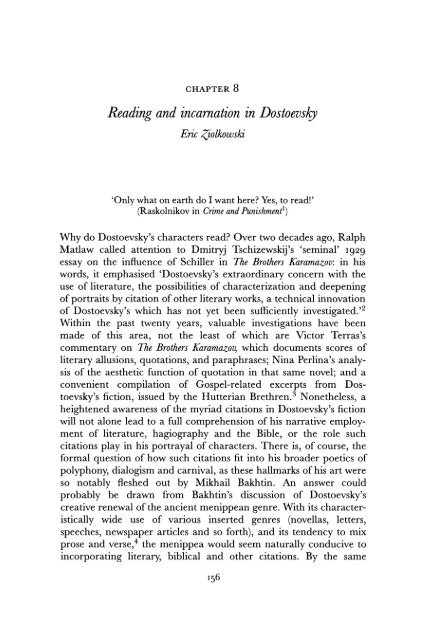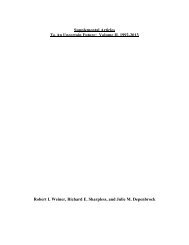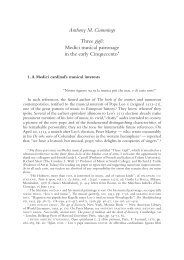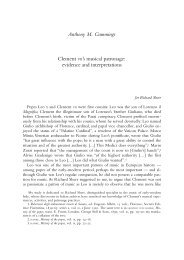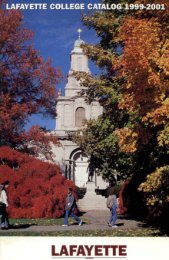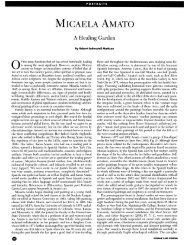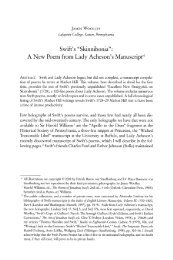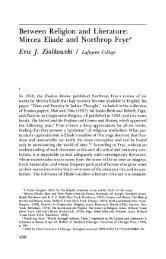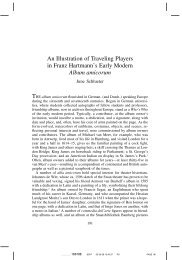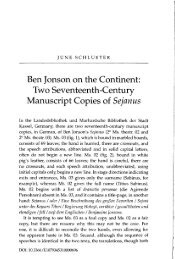Ziolkowski-Dost ... ianTradition-2001-p156.pdf
Ziolkowski-Dost ... ianTradition-2001-p156.pdf
Ziolkowski-Dost ... ianTradition-2001-p156.pdf
You also want an ePaper? Increase the reach of your titles
YUMPU automatically turns print PDFs into web optimized ePapers that Google loves.
CHAPTER 8<br />
Reading and incarnation in <strong>Dost</strong>oevsky<br />
Eric <strong>Ziolkowski</strong><br />
‘O n ly what on earth do I want here? Yes, to read!’<br />
(Raskolnikov in Crime and Punishment1)<br />
W hy do <strong>Dost</strong>oevsky’s characters read? O ver two decades ago, Ralph<br />
M atlaw called attention to Dmitryj Tschizewskij’s ‘seminal’ 1929<br />
essay on the influence o f Schiller in The Brothers Karamazov: in his<br />
words, it emphasised ‘<strong>Dost</strong>oevsky’s extraordinary concern with the<br />
use o f literature, the possibilities o f characterization and deepening<br />
o f portraits by citation o f other literary works, a technical innovation<br />
o f <strong>Dost</strong>oevsky’s which has not yet been sufficiently investigated.’2<br />
Within the past twenty years, valuable investigations have been<br />
made o f this area, not the least o f which are Victor Terras’s<br />
commentary on The Brothers Karamazov, which documents scores o f<br />
literary allusions, quotations, and paraphrases; Nina Perlina’s analysis<br />
o f the aesthetic function o f quotation in that same novel; and a<br />
convenient compilation of Gospel-related excerpts from <strong>Dost</strong>oevsky’s<br />
fiction, issued by the Hutterian Brethren.3 Nonetheless, a<br />
heightened awareness o f the myriad citations in <strong>Dost</strong>oevsky’s fiction<br />
will not alone lead to a full comprehension o f his narrative employment<br />
o f literature, hagiography and the Bible, or the role such<br />
citations play in his portrayal o f characters. There is, o f course, the<br />
formal question o f how such citations fit into his broader poetics of<br />
polyphony, dialogism and carnival, as these hallmarks o f his art were<br />
so notably fleshed out by Mikhail Bakhtin. An answer could<br />
probably be drawn from Bakhtin’s discussion o f <strong>Dost</strong>oevsky’s<br />
creative renewal o f the ancient menippean genre. With its characteristically<br />
wide use o f various inserted genres (novellas, letters,<br />
speeches, newspaper articles and so forth), and its tendency to mix<br />
prose and verse,4 the menippea would seem naturally conducive to<br />
incorporating literary, biblical and other citations. By the same<br />
156
Reading and incarnation in <strong>Dost</strong>oevsky<br />
157<br />
token, Perlina has already performed a great service for students o f<br />
The Brothers Karamazov by demonstrating from a Bakhtinian perspective<br />
that ‘quotation organizes the whole architectonics o f [that]<br />
novel’.5<br />
However, even the critical contributions o f Bakhtin and the<br />
further application o f his theories by Perlina cannot exhaust the<br />
matter o f literary and biblical citations in <strong>Dost</strong>oevsky. After identifying<br />
such citations, interpreting their bearing upon characterisation,<br />
and settling the question o f their pertinence to narrative form,<br />
we would be left with a still more fundamental question. Citations of<br />
written texts presuppose reading. W hy do <strong>Dost</strong>oevsky’s characters<br />
read in the first place? Or, what is the significance o f reading as an<br />
act in <strong>Dost</strong>oevsky’s fiction?<br />
In this chapter I suggest that the act o f reading by <strong>Dost</strong>oevsky’s<br />
protagonists, especially when they read or recite aloud, bears directly<br />
upon a constant compulsion o f his narratives towards intimating and<br />
depicting the phenomenon o f incarnation - a term I shall use<br />
primarily in a distinct literary sense adopted from Bakhtin’s Brazilian-born<br />
Spanish contemporary, the Hispanist A m érico Castro<br />
(1885-1972), but also, ultimately, in the theological sense bequeathed<br />
by the Gospel o f John.6 W hile Russian piety may be primarily rooted<br />
in the ocular reverence o f the icon, the spirits and whole inner<br />
beings o f <strong>Dost</strong>oevsky’s protagonists often prove to be decisively<br />
affected or even shaped through some form o f the act o f reading, or<br />
through hearing some form o f recitation or reading aloud.<br />
For a reason that will soon become clear, I wish to begin by<br />
directing our attention back to a familiar figure from late antiquity.<br />
AUGUSTINE, ZOSIMA AND THE QUESTION OF READING<br />
In his Confessions (written 397-401 a d ), St Augustine famously recalls<br />
having pondered as a young man why St Ambrose, the great<br />
Catholic bishop o f M ilan whom he sometimes observed reading,<br />
never read aloud. Perhaps, Augustine conjectures, Ambrose worried<br />
that if he read aloud, some difficult passage he recited might stir a<br />
listener’s curiosity, and Ambrose might be asked to pause to expound<br />
it and thus be prevented from reading as much as he desired. O r<br />
perhaps he read to himself simply to preserve his voice (6,3).<br />
W hatever the case was, there can be no denying the extraordinariness<br />
o f Am brose’s behaviour, given that it was evidently customary
158<br />
ERIC ZIOLKOWSKI<br />
for educated adults to read aloud to themselves.7 Augustine’s initial<br />
conjecture may do less to illuminate Am brose’s habit o f silent<br />
reading than to manifest Augustine’s own concern with the herm eneutics<br />
o f textual depths and obscurities, especially those o f the holy<br />
scriptures. W hen he had first read the scriptures, before he met<br />
Ambrose, they had put him off: ‘For my bulging pride’, he tell us,<br />
‘shunned their style, and my sharpness o f mind did not penetrate<br />
their inner m eaning’. O nly later - having come to appreciate them<br />
as ‘humble in pace, lofty in manner, and veiled in mysteries’ (3,5)8 -<br />
did he formulate his theory o f figurative expression, espousing in De<br />
doctrina christiana (written 396-426) that the divinely inspired m eanings<br />
o f scripture frequently lie concealed beneath textual obscurities<br />
and ambiguities but are perceptible through allegorical reading<br />
(2,6,7-8).<br />
W hat caused Augustine such great concern in the late fourth<br />
century hardly troubled <strong>Dost</strong>oevsky’s fictional Elder Zosima a<br />
millennium and a half later, as the Orthodox tradition to which<br />
Zosima adhered was less concerned with hermeneutic explication<br />
than was the Catholic tradition which Augustine had helped engender.9<br />
Alyosha’s ‘Biographical Notes’ on Zosima in Book 6 o f The<br />
Brothers Karamazov record the Elder’s instruction that village priests<br />
should make a habit of reading the Bible aloud to the peasants once<br />
a week - hardly a surprising piece o f advice, given that most o f the<br />
peasants were illiterate and had no choice. Absent from his speech<br />
on this matter is even the slightest intimation o f an Augustinian (or<br />
Ambrosian) concern about scriptural obscurities, or about the<br />
difficulties listeners might have in fathoming them. All a priest has to<br />
do, says Zosima, is ‘open that book and begin reading it without<br />
grand words or superciliousness, without condescension to them, but<br />
gently and kindly, . . . only stopping from time to time to explain<br />
words that are not understood by the peasants. D on’t be anxious,<br />
they will understand everything, the orthodox heart will understand<br />
all!’ (272).10<br />
Zosim a’s suggestion corresponds with <strong>Dost</strong>oevsky’s own expressed<br />
convictions. <strong>Dost</strong>oevsky wrote that even if the Russian people o f his<br />
time knew the Gospel poorly and were ignorant of basic principles of<br />
faith, they did ‘know Christ’ and had ‘been carrying Him in their<br />
hearts from time immemorial’.11 This notion seems far removed<br />
from Augustine’s premise in De doctrina Christiana that learning certain<br />
interpretive ‘precepts’ is a prerequisite for correctly understanding
Reading and incarnation in <strong>Dost</strong>oevsky<br />
159<br />
the scriptures and eschewing ‘the absurdity o f improper m eaning’<br />
(prol. 9: absurditas pravae sententiae). In Augustine’s view, the untrained<br />
mind could be afforded no instant recognition o f Christ simply by<br />
reading or hearing the Gospel. According to the Confessions, his own<br />
serendipitous reading o f a passage from St Paul was what finally<br />
triggered his conversion (8,12). Yet such a scripturally-induced<br />
experience would have been all but inconceivable had he not first<br />
learned from Ambrose how to interpret the scriptures ‘spiritually’<br />
(6,4) and therefore to take them seriously. It is doubtful he would<br />
have agreed with <strong>Dost</strong>oevsky’s proposal in a letter o f 1878 that the<br />
best way to convert an unbeliever is by jettisoning discussion and<br />
arguments, and simply reading with the ‘best possible attention’ all<br />
o f Paul’s letters.12<br />
This disagreement harks back to the momentous doctrinal divergence<br />
between the Western, Latin, Roman Catholic tradition which<br />
Augustine helped engender, and the Eastern, originally Cappadocian<br />
and Greek, Orthodox tradition whose Slavonic outgrowth<br />
furnished the religious context that formed <strong>Dost</strong>oevsky’s beliefs and<br />
informed his art. For modern scholars, the writings o f Augustine,<br />
who remained little known and exerted practically no influence in<br />
the East, help mark the initial bifurcation o f Christian thinking into<br />
Eastern and Western doctrines on such basic matters as trinitarianism<br />
and the interpretation o f Adam , the fall and original sin.13<br />
<strong>Dost</strong>oevsky, as an adherent to Orthodoxy, was certainly no heir of<br />
the Augustinian tradition. The difference between Zosima and<br />
Augustine in their hermeneutic assumptions about scriptures may<br />
therefore be illuminated by an observation by G eorgy Fedotov<br />
regarding the distinct stances o f Augustine and the early Russian<br />
Christians towards the cultures that inspired them: ‘The wholehearted<br />
acceptance o f culture, the freedom from obscurantism, is<br />
very often a sign o f the barbarian youthfulness o f a nation attracted<br />
mightily by a higher and “ sacred” culture and unable to perceive<br />
the spiritual dangers inherent in every product o f the human m ind’<br />
- the ‘product’ referred to here being books. Augustine, Fedotov<br />
continues, ‘is obscurantist in his relation to Plato or the ancient<br />
culture in general, but Bede and Colum ban are not. The first<br />
Christian generations in Russia worship the sacred Greek culture in<br />
the same way in which the Celtic or Saxon monks worshipped the<br />
Latin one.’ 14<br />
The unquestioning attitude o f the early Russian Christians
160<br />
ERIC ZIOLKOWSKI<br />
towards books and reading did not soon dissipate. Fedotov amply<br />
documents the veneration o f books that found expression in the<br />
anonymous fourteenth-century ‘collection’ (izbornik) o f devotional<br />
readings, Izmaragd (‘Em erald’), which would remain the favourite<br />
compilation o f its kind among the Russian laity for the next four<br />
centuries. M aking no attempt to distinguish the divine revelation o f<br />
the Bible from the theological writings o f the Church fathers,<br />
Russians regarded all religious literature as ‘sacred’ and ‘divine’.<br />
The Izmaragd, like most other izborniki, opens with a set o f writings<br />
on ‘books’ and ‘book reading’, expounding that books are creations<br />
o f the H oly Spirit; that God, in exhorting human beings to study His<br />
law, was referring to the study o f books; that the person who holds<br />
books in hand will be unable to forget those ‘terrible books’ of<br />
Judgment which will be opened in the age to come; and that the<br />
person who blasphemes or fails to heed sacred books shall be judged<br />
and punished.15 Books and reading are thus endowed with eschato-<br />
logical significance.<br />
<strong>Dost</strong>oevsky’s inheritance o f such venerational attitudes towards<br />
books and reading is documented in his Diary o f a Writer. If, for<br />
example, a Christian text o f medieval K iev can eulogise ‘book<br />
learning’ by praising books as ‘the fountainhead o f wisdom’, ‘the<br />
bridle o f temperance’, and by quoting from the Wisdom of<br />
Solomon to legitimate the authority o f the wisdom books,16 this<br />
eulogy anticipates a remark made by <strong>Dost</strong>oevsky in an entry of<br />
1876. After expressing doubt that many Russians know about the<br />
saint Tikhon o f Zadonsk, he asks: ‘W hy should one be so blankly<br />
ignorant; why should one promise oneself not to read? Is it for lack o f<br />
time? Believe me, . . . you would be learning beautiful things.,17 And if<br />
early Russian Christians deemed books to be eschatologically<br />
pertinent, this judgm ent renders all the more comprehensible <strong>Dost</strong>oevsky’s<br />
rumination that if human beings were to be asked at the<br />
end o f time whether they understood their life on earth, and what<br />
they concluded from it, their most adequate response could already<br />
be found in a book - not just any book, but a work o f fiction that is<br />
widely regarded as the first modern novel: ‘M an could silently hand<br />
over Don Quixote: “ Such is my inference from life. - C an you<br />
condemn me for it?” ’ 18<br />
This apocalyptic valuation o f Cervantes’s classic, a valuation<br />
reiterated elsewhere in Diary o f a Writer,19 accords with <strong>Dost</strong>oevsky’s<br />
pre-eminently Romantic view o f the novel’s hero.20 In an oft-quoted
Reading and incarnation in <strong>Dost</strong>oevsky<br />
i6 i<br />
letter, he compares Don Quixote to Christ, calling Christ the ‘only<br />
one positively beautiful person [on earth]’ and Don Quixote ‘the<br />
most finished’ o f all ‘beautiful characters in Christian literature’.21<br />
He surely perceived in the K night o f La M ancha six traits<br />
corresponding to his own notion o f true religion: faith, compassion,<br />
suffering, a tendency towards humiliation, foolishness (à la ‘holy<br />
fools’), and being childlike.22 Moreover, he was evidently intrigued<br />
by the fact that the entire plot and narrative o f the Quixote<br />
essentially revolve around the matter o f books, reading and their<br />
effects. The protagonist, after all, is a man gone mad from obsessive<br />
reading o f chivalry books, and his delusional career as knight stems<br />
from his ongoing effort to make reality conform to his book-derived<br />
fantasies.23<br />
It is unclear whether <strong>Dost</strong>oevsky was aware o f his own indebtedness<br />
to the Quixote for its having introduced into literature a special<br />
narrative phenomenon involving the act o f reading by protagonists.<br />
Nonetheless, as we shall see, this phenomenon achieves full, transmogrified<br />
fruition in <strong>Dost</strong>oevsky, tending towards conjuring the<br />
Johannine vision o f the Word-become-Flesh.<br />
INCARNATIONAL READING IN DOSTOEVSKY<br />
In an essay o f 1947 - an essay easily as respected among cervantistas as<br />
Tschizewskij’s is among <strong>Dost</strong>oevsky scholars - Am érico Castro<br />
proposed that the Q uixote’s ‘supreme novelty’ lay in its initiating a<br />
new form o f literary creation, one that<br />
shows us that the reality o f existence consists in receiving the im pact o f all<br />
that can affect man from without, and in transform ing these influences into<br />
outwardly manifest life processes. T h e illusion o f a dream , devotion to a<br />
belief - in short, the ardently yearned for in any form becom es infused in<br />
the existence o f him who dreams, believes, or longs; and thus, what was<br />
before transcendency without bearing on the process o f living becom es<br />
em bodied into life.24<br />
T he overriding theme o f the Quixote is thus ‘the interdependence, the<br />
“ interrealisation” o f what lies beyond m an’s experience and the<br />
process o f incorporating that into his existence’ (26-27).<br />
This creative life ‘process’ Castro calls incarnation (encarnación),<br />
which is closely akin to what Bakhtin has in mind when he speaks of<br />
the sway that quotations as ‘authoritative’ and ‘internally persuasive’<br />
utterances have upon the ‘ideological becoming o f a human being’.25
l62<br />
ERIC ZIOLKOWSKI<br />
And, he observes, the spoken, written and printed word stands preeminent<br />
among all the external ‘incitements’ that become ‘incarnated’<br />
in the lives o f Cervantes’s characters. The first o f the Quixote’s<br />
two parts essentially grows out o f books read by D on Quixote. Part 2<br />
grows out o f part 1, as the life o f the protagonist incorporates his<br />
awareness o f having already been the subject o f a book. And the<br />
D on Quixote o f part 2 perpetuates himself and the literary interpretation<br />
o f the fictive author (Cide Hamete Benengeli), appearing to<br />
those who encounter him as both a living person and a ‘human-<br />
literary figure’ (42). ‘The traditional themes o f literature’, Castro<br />
points out, ‘are now fused with the living experience o f those<br />
themes; the book then becomes not only a book, but it also becomes<br />
the reader who has incorporated its poetic material into his very life’<br />
(43).•26<br />
Although considerable scholarly attention has been paid to <strong>Dost</strong>oevsky’s<br />
literary relationship to Cervantes,27 and although Castro<br />
mentions <strong>Dost</strong>oevsky as one o f the most important later novelists<br />
whose stylistic innovations were affected by the ‘various stimuli’<br />
radiating from the Quixote,28 the extraordinarily fruitful evolvement<br />
o f the incarnational phenomenon in <strong>Dost</strong>oevsky’s fiction has yet to<br />
be acknowledged. To be sure, Bakhtin does seem to touch upon this<br />
phenomenon when he contends that ‘at the center o f <strong>Dost</strong>oevsky’s<br />
artistic world must lie dialogue’, in which ‘a person not only shows<br />
himself outwardly, but he becomes for the first time that which he<br />
is.’29 The dialogic process whereby a person ‘becomes that which he<br />
is’ might seem closely related to what Castro meant by ‘incarnation’<br />
through reading. Elsewhere, Bakhtin pertinently comments upon<br />
that type o f novel that concentrates its critique o f literary discourse<br />
around the hero as:<br />
a ‘literary m an’, who looks at life through the eyes o f literature and who<br />
tries to live ‘according to literature’ . Don Quixote and Madame Bovary are the<br />
best-known exemplars o f this type, but the ‘literary m an’ and the testing o f<br />
that literary discourse connected with him can be found in almost every<br />
m ajor novel (to a greater or lesser extent these are the characters in Balzac,<br />
<strong>Dost</strong>oevsky, Turgenev, etc.); they differ from each other only in the relative<br />
weight accorded this feature in the novel as a w hole.30<br />
Nonetheless, in concentrating upon dialogism in <strong>Dost</strong>oevsky’s<br />
novels ostensibly as an ideological and epistemological mode in the<br />
lives o f those novels’ characters, Bakhtin and consequently Perlina as<br />
well stop short o f fully acknowledging the existential, incarnational
Reading and incarnation in <strong>Dost</strong>oevsky<br />
163<br />
import o f the reading-act itself for those characters. O f course this is<br />
not to overlook that Bakhtin maintained his ostensible focus largely<br />
for political reasons, and that readers might in some instances read<br />
between his lines to glean possible religious implications. For during<br />
the years leading up to the initial publication o f his <strong>Dost</strong>oevsky book<br />
(1929), he had, in response to the Soviet crack-down on religious<br />
institutions, practices and expression, ‘reoriented his approach in his<br />
writings and largely abandoned his N eo-Kantian vocabulary for one<br />
that was more secular and sociological.’31 Yet, as Ruth Coates has<br />
shown, Bakhtin remained, behind any appearance to the contrary, ‘a<br />
philosopher whose work is fed by certain aspects o f the Christian<br />
vision o f and for the world’.32<br />
<strong>Dost</strong>oevsky’s fictive world is saturated with the ubiquitous trappings<br />
o f the modern typographic culture - the Gutenberg galaxy, as<br />
Marshall M cLuhan so memorably dubbed it - which helped make<br />
widespread literary incarnation possible in the first place.33 Not<br />
surprisingly, the financial attraction o f the publishing business itself<br />
is manifest: Dm itry Karam azov, in prison, states his ambition to start<br />
a newspaper (BK 558), and peripheral characters such as Razum i-<br />
khin and Rakitin also entertain plans o f going into publishing (CP,<br />
263; BK 73). To be sure, the culture o f print had developed very late<br />
in Russia, where more manuscripts were still in circulation than<br />
printed books until the mid-eighteenth century. In fact, the print<br />
business o f Nikolai Novikov produced more books between 1775 and<br />
1789 than had been published in Russia since the introduction of<br />
printing.34 Nonetheless, the nineteenth-century Russian society depicted<br />
in <strong>Dost</strong>oevsky’s novels is one whose intelligentsia and educated<br />
elite reveres the published word, as betokened by<br />
Raskolnikov’s initial reaction when he sees his own article in the<br />
newspaper: he experiences ‘the strange and painfully sweet sensations<br />
o f the author who sees himself in print for the first time’ (CP,<br />
434). Given all the attention he receives for this article, he anticipates<br />
Ivan Karam azov, who achieves early recognition for his own<br />
published journalism, especially his article on ecclesiastical courts<br />
(BK, 11).<br />
The phenomenon o f literary incarnation born in the Quixote - a<br />
novel published less than a century and a half after the death of<br />
Johannes Gutenberg (c. 1400-68) - seems pervasively inherent in<br />
the more fully developed print culture o f <strong>Dost</strong>oevsky’s characters.<br />
The phenomenon seems most blatant when one character can
164<br />
ERIC ZIOLKOWSKI<br />
interpret some trait in another character’s personality by identifying<br />
that trait with an author whose qualities the latter m ay rightly or<br />
wrongly seem to incarnate as a result o f reading. For example,<br />
Svidrigailov, who calls Raskolnikov ‘a Schiller, a Russian Schiller, an<br />
absolute Schiller’ tells him: ‘The Schiller in you is always getting into<br />
a muddle’ (CP, 408, 410). This identification o f Raskolnikov with<br />
Schiller was earlier hinted at by a question put to him by Porphiry,<br />
who clearly assumed that Raskolnikov was familiar enough with<br />
Schiller to recognise when someone’s speech resembled that o f the<br />
Germ an poet: ‘W hat are you smiling at again - because I am talking<br />
like Schiller?’ (389). A t the same time, Dmitry Karam azov, having<br />
apparently committed numerous literary sources to memory (like<br />
Schiller, whom he had read ‘till he knew him by heart’ (BK, 176)),<br />
seems to have absorbed them so deeply that they are part o f his selfidentity<br />
and can well up into his consciousness whenever he happens<br />
to find himself in situations that call them to mind. O n repeated<br />
occasions he spontaneously identifies himself with specific voices<br />
from works o f great poets (Schiller, Pushkin, Shakespeare), grafting<br />
their personalities and roles onto his own existence by quoting verses<br />
from them that seem appropriate to his own immediate mood - as<br />
when he sadly tells Perkhotin: ‘D o you remember Hamlet? “ I am<br />
very sorry, good Horatio! Alas, poor Yorick!” Perhaps that’s me,<br />
Yorick? Yes, I’m Yorick now, and a skull afterwards’ (383).35<br />
I cannot broach here the almost limitless array o f more complex<br />
and subtler incarnational phenomena in <strong>Dost</strong>oevsky, or all the<br />
complexities involved in distinguishing exactly how each character<br />
views the particular texts which he or she might read, recite, or hear<br />
read aloud or recited. I conclude simply by indicating how a<br />
sequence o f three familiar scenes, all o f them involving characters<br />
reading aloud, reveals a progressive rejoining o f the phenomenon o f<br />
literary incarnation with its theological paradigm: the doctrine of<br />
the incarnate Word as set forth in <strong>Dost</strong>oevsky’s favourite Gospel, the<br />
fourth. Observing that ‘the indisputably authoritative word is the<br />
word o f H oly W rit’, Perlina notes that The Brothers Karamazov involves<br />
a complex ‘hierarchy o f quotations’ on whose ‘slopes’ the ‘words’ o f<br />
the different characters vie with each other dialogically, some<br />
progressing upwards ‘from the internally persuasive to the authoritative’,<br />
others degenerating downwards ‘from persuasiveness to false<br />
authority.’36 If this is true, then we should not be surprised that,<br />
within the hierarchy o f <strong>Dost</strong>oevsky’s works, it will be only in a single
Reading and incarnation in <strong>Dost</strong>oevsky<br />
165<br />
instant within that final novel that the phenomenon o f literary<br />
incarnation and the doctrine o f the incarnate Word symbolically<br />
touch.<br />
The first scene is that in which Raskolnikov commands Sonya to<br />
read to him the account o f the resurrection o f Lazarus (CP, 274-75),<br />
an account which, as she has to remind him, occurs only in the<br />
fourth Gospel. The old and worn, leather-bound Russian New<br />
Testament in her possession, she informs him, was brought to her by<br />
Lizaveta, with whom she used to read. So even as she hesitatingly<br />
begins to oblige his repeated command, ‘Read it!’, by reading aloud<br />
from that copy, the irony is already clear (to us, as well as to<br />
Raskolnikov) that Sonya is unwittingly re-enacting with the killer the<br />
sacred reading-ritual which she formerly practised with his victim-<br />
to-be. This irony will be compounded at the novel’s end, where it is<br />
disclosed that the convicted and imprisoned Raskolnikov now keeps<br />
that same copy o f the N ew Testament under his pillow (as <strong>Dost</strong>oevsky<br />
himself kept a copy o f it under his pillow during four years of<br />
penal servitude).37 If this final disclosure will portend Raskolnikov’s<br />
putatively impending regeneration, one aside regarding the present<br />
scene already hints in that direction: the narrator’s remark that,<br />
upon reading the verse telling that Lazarus had ‘been dead four<br />
days’, Sonya ‘strongly’ emphasises the word ‘four’ (277). Four days<br />
have passed since Lizaveta and the pawnbroker were killed, and<br />
Sonya means to imply that Lizaveta, like Lazarus, will spiritually rise<br />
and - as Sonya said moments earlier - ‘see G od’ (275). But we know<br />
that this occasion o f Sonya’s reading also marks a crucial initial stage<br />
in the spiritual resurrection o f Raskolnikov.<br />
In this scene, which would perfectly illustrate Zosim a’s advice on<br />
the value o f reading aloud the Bible, the themes o f divine incarnation<br />
and literary incarnation remain separate. The incarnate G od is<br />
present as miracle-worker in the Lazarus story which is read aloud,<br />
while the human protagonist, the listener who recalls having read<br />
this tale ‘a long time ago . . . W hen I was at school’ (275), seems<br />
already to have begun incarnating an incitement he m ay recall<br />
(consciously or unconsciously) from elsewhere in the fourth Gospel:<br />
Jesus’s distanciating remark to his mother at the wedding at Cana,<br />
‘Woman, what have I to do with thee? mine hour is not yet com e’<br />
(John 2:4). Immediately following Sonya’s reading, Raskolnikov<br />
announces abruptly and likewise: ‘Today I deserted my family, my<br />
mother and sister... I have made a complete break’ (278).
166<br />
ERIC ZIOLKOWSKI<br />
The second scene whose incarnational import I want to consider<br />
occurs in The Idiot, whose hero, as we know from <strong>Dost</strong>oevsky’s letters<br />
and notebooks, was consciously conceived to blend the images of<br />
Don Quixote and the Johannine Christ. Just as there are indications<br />
in the novel’s first part that Nastasia implicitly recognises M yshkin’s<br />
saintly or Christlike nature, so Aglaya Epanchina explicitly recognises<br />
his quixotic nature in part 2. After reading a letter from the<br />
prince, she places it in a volume o f Cervantes’s novel and bursts out<br />
laughing.38 Later, in the company o f her family, the prince and<br />
others, she explains the link between Pushkin’s ballad A Poor<br />
K night’ and D on Quixote (266), and then recites the ballad aloud<br />
from memory, slyly changing the letters inscribed on the hero’s<br />
shield, A. M . D. (Ave Mater Dei), to A. N. B. (Ave Nastasia Barashkova)<br />
(2:7). Although the mocking association which Aglaya means to draw<br />
between the prince and the two literary knights escapes most o f the<br />
persons present, the prince discerns it, and there is something<br />
strangely fatalistic about the way the content o f the Pushkin poem<br />
becomes infused, or incarnated, in his subsequent life. (Noteworthily,<br />
he will later proceed to read all o f Pushkin’s works with Rogozhin<br />
(556)). His unflagging compassion for Nastasia, the ‘fallen’ woman,<br />
will recall not only Christ’s refusal to condemn the adulterous<br />
woman (another story from John’s Gospel) but also A glaya’s interpretation<br />
o f the ‘poor knight’ as one who would still ‘believe in’ his<br />
lady ‘even if she became a th ief’ (266). Aglaya will even hint at these<br />
associations when she later suggests to him that he is ‘sacrificing’<br />
himself by refusing to marry Nastasia (445). By the end, when he<br />
winds up back in the Swiss sanatorium as a relapsed idiot, we will<br />
realise the extreme extent to which he incarnates the closing stanza<br />
o f ‘A Poor K night’: ‘Returning to his distant castle, / There he lived<br />
and sighed, / Ever silent, sad, and cheerless, / O f reason bereft, he<br />
died’ (quoted at 269).<br />
W hile it was out o f compassion and for Raskolnikov’s spiritual<br />
benefit that Sonya read to him from the Gospel, Aglaya recites the<br />
Pushkin poem with her mocking insertions specifically in order to<br />
prick and embarrass the prince. Nonetheless, Sonya’s reading and<br />
A glaya’s recitation end up having comparable effects, infusing the<br />
minds (and hence the actions and lives) o f Raskolnikov and<br />
Myshkin with the images o f the Johannine Christ and the Christlike<br />
knight. It is therefore left to Ivan K aram azov to be so bold as<br />
to as to retrieve from the Bible and, in effect, to re-incarnate the
Reading and incarnation in <strong>Dost</strong>oevsky<br />
167<br />
Divine Logos in the character o f Christ within the ‘The Grand<br />
Inquisitor5, the prose-poem o f his own creation which he rehearses<br />
to Alyosha in the Metropolis tavern. It is significant that Ivan<br />
recites it extemporaneously with no text in hand; that, indeed,<br />
although he asserts that he ‘composed’ it a year earlier, he also<br />
claims to have ‘never written’ it down; and that therefore Alyosha<br />
is its ‘first reader - that is, listener’ (BK, 227). Suffice it for me to<br />
close by remarking the significance o f what happens moments after<br />
the recitation o f the poem is done. W hen the saintly listener kisses<br />
his rebellious brother on the lips, in precise emulation o f the<br />
parting kiss Christ gave the Inquisitor in the poem, the act is more<br />
than simply ‘plagiarism’, which is what Ivan jokingly calls it, or ‘a<br />
reaccented quotation’, which is what Perlina calls it.39 The kiss<br />
confirms that the conjured exemplum o f the Incarnate God, the<br />
Christ o f Ivan’s tale, has hit its mark as an incitement in Alyosha’s<br />
mind, and perhaps even his soul. A tremendous irony it may seem<br />
that this incitement was emitted from the imagination o f a rebel-<br />
against-God. Yet the Word is the Word, or the Logos, the Logos,<br />
no matter by whom or in what spirit it is conveyed. And evidently<br />
for <strong>Dost</strong>oevsky, the Word, when recited aloud by a human - and<br />
Russian - voice, bears for the listener a force much profounder<br />
than the silence o f Am brose’s study or o f Don Q uixote’s reading<br />
room.<br />
NOTES<br />
1 Fyodor <strong>Dost</strong>oevsky, Crime and Punishment, trans. Jessie Senior Coulson,<br />
Norton C ritical Edition with Backgrounds, Sources, and Essays in<br />
Criticism , ed. G eorge G ibian (New York, 1964; 3rd edn 1989), 2:6, 135<br />
(hereafter CP).<br />
2 Preface to Fyodor <strong>Dost</strong>oevsky, The Brothers Karamazov, trans. Constance<br />
Garnett, revised by R alph E. Matlaw, Norton Critical Edition with<br />
Backgrounds, Sources, and Criticism (New York, 1976) (hereafter B K ),<br />
vii. See D. Tschizewskij, ‘Schiller und Die Brüder Karamazov’, Zeitschrift<br />
für slavische Philologie, 4 (1929), 1-4 2 , excerpts from which are reprinted<br />
as ‘Schiller and The Brothers Karamazov’, trans. M atlaw, in BK ,<br />
794- 807.<br />
3 V ictor Terras, A Karamazov Companion: Commentary on the Genesis, Language,<br />
and Style of <strong>Dost</strong>oevsky’s Novel (Madison, W I, 1981); N ina Perlina, Varieties<br />
of Poetic Utterance: Quotation in ‘The Brothers Karamazov’ (Lanham, 1985);<br />
The Gospel in <strong>Dost</strong>oyevsky: Selections from His Works, ed. the Hutterian<br />
Brethren (Ulster Park, NY, 1988).
168<br />
ERIC ZIOLKOWSKI<br />
4 M ikhail Bakhtin, Problems of <strong>Dost</strong>oevsky’s Poetics, ed. and trans. C aryl<br />
Emerson (Minneapolis, M N , 1984), intermittently throughout, but<br />
especially 112-22.<br />
5 Perlina, Varieties, 39.<br />
6 See Am erico Castro, ‘Incarnation in Don Quijote’, in An Idea of History:<br />
Selected Essays of Americo Castro, trans. and ed. Stephen Gilm an and<br />
Edm und L. K in g (Columbus, O H , 1977), 23-76.<br />
7 Plutarch, interestingly, opines that reading aloud is good for the health.<br />
Advice About Keeping Well, par. 16, Moralia, 130C-D , in Plutarch’s Moralia,<br />
15 vols., with English translation by Frank C ole Babbitt, Loeb Classical<br />
Library (Cam bridge, M A , 1927-69), 2:257-59. A ccording to Leo C .<br />
Ferrari, Augustine’s Confessions itself ‘was written to be read aloud<br />
before an assembled audience’ (‘Beyond Augustine’s Conversion<br />
Scene’, in Augustine: From Rhetor to Theologian (Waterloo, O N , 1992),<br />
97-108; here 102. See also C alvin L. Troup, Temporality, Eternity, and<br />
Wisdom: The Rhetoric of Augustine’s Confessions (Colum bia, S C , 1999), 48.<br />
8 Translations o f Augustine are mine.<br />
9 Indeed, a century after <strong>Dost</strong>oevsky, an O rthodox priest like Georges<br />
Florovsky could still express wariness towards hermeneutics: ‘We are in<br />
danger o f losing the uniqueness o f the W ord o f G od in the process o f<br />
continuous “ reinterpretation” . But how can we interpret at all if we<br />
have forgotten the original language?’ (Bible, Church, Tradition: An Eastern<br />
Orthodox View (Belmont, M A , 1972), 10). This is not to suggest that<br />
Florovsky denies that scriptural revelation requires interpretation (see<br />
ibid., 17-36). Yet, relative to Catholicism , the distinctly lesser concern<br />
with, or wariness towards, scriptural herm eneutics in Russian O rth odoxy<br />
m ay be attributable, at least in part, to the overbearing emphasis<br />
which the O rthodox always placed upon the seven Ecum enical C o u n <br />
cils o f 325-681 AD . As Tim othy W are (Bishop Kallistos o f Diokleia)<br />
points out, the Councils ‘defined once and for all the C h u rch ’s teaching<br />
upon the fundam ental doctrines o f the Christian faith’, doctrines that<br />
are hence to be accepted as ‘absolute and unchanging’ (The Orthodox<br />
Church, new edn (London, 1993), 20, 197).<br />
10 References to The Brothers Karamazov are from the edition cited in note 2.<br />
11 ‘V la s’ (1873), in F. M . <strong>Dost</strong>oievsky, The Diary of a Writer, trans. Boris<br />
Brasol (Salt Lake City, U T, 1985), 38.<br />
12 To N. L. Osmidov, in Letters of Fyodor Michailovitch <strong>Dost</strong>oevsky, trans. Ethel<br />
C olburn M ayne (New York, 1964), 233.<br />
13 For exam ple, G. P. Fedotov, The Russian Religious Mind, 2 vols. (Cam <br />
bridge, M A , 1966), vol. 1, 27, 221-22, 223; Jaroslav Pelikan, The Christian<br />
Tradition: A History of the Development of Doctrine, 5 vols. (Chicago, IL,<br />
1971-89), vol. 2, 181, 260, 272.<br />
14 Russian Religious Mind, vol. 1, 379.<br />
15 Ibid., vol. 2, 41-43.<br />
16 Ibid., vol. 1, 377.
Reading and incarnation in <strong>Dost</strong>oevsky<br />
i6g<br />
17 Ibid., vol. 1, 377; <strong>Dost</strong>oevsky, Diary, 203, my emphasis.<br />
18 Diary, 260, quoted in Eric J . <strong>Ziolkowski</strong>, The Sanctification of Don Quixote: From<br />
Hidalgo to Priest (University Park, PA, 1991), 114-15. O n the view o f the<br />
Quixote as ‘the first and unsurpassed m odel o f the m odern realist novel’<br />
(M. M en éndez y Pelayo), see <strong>Ziolkowski</strong>, Sanctification, 1, including<br />
note 1.<br />
19 See A lie is saved by a lie’ (September 1877), in Diary, 836.<br />
20 See <strong>Ziolkowski</strong>, Sanctification, 95-126.<br />
21 Letter 1/13 January 1868 to Sofia (his niece), as quoted in Robin Feuer<br />
Miller, <strong>Dost</strong>oevsky and The Idiot: Author, Narrator, and Reader (Cam bridge,<br />
M A , 1981), 74. As indicated by <strong>Ziolkowski</strong>, Sanctification, 113, note 41,<br />
M iller omits from her translation o f the pertinent passage a parenthetical<br />
sentence that specifies ‘the whole Gospel o f St John’ as D ostoevsky’s<br />
source for the ‘thought’ o f the beautiful as an ‘ideal’: ‘John<br />
sees the wonder o f the Incarnation, the visible apparition o f the<br />
Beautiful’ (quoted from <strong>Dost</strong>oevsky, Letters, 142).<br />
22 See <strong>Ziolkowski</strong>, Sanctification, 120-25.<br />
23 D ostoevsky’s A lie is saved by a lie’ (note 19 above), 835-38, conveys his<br />
fascination with the w ay D on Q uixote overcomes a certain doubt that<br />
at one point threatens his belief in the truth o f chivalry books. For<br />
discussion see <strong>Ziolkowski</strong>, Sanctification, 116-17.<br />
24 ‘Incarnation’, 23, 26. See viii-ix for references to the original 1947<br />
sources, as well as a 1957 source in which this essay previously appeared<br />
(in both English and Spanish).<br />
25 See Perlina, Varieties, 14-6 .<br />
26 Com pare Carlos Fuentes, Don Quixote, or the Critique of Reading (Austin,<br />
T X , 1976).<br />
27 For exam ple, W olfgango L. Giusti, ‘Sul donchischiottismo di alcuni<br />
personaggi del <strong>Dost</strong>ohevskij’ in Cultura, 10 (1931), 171-79; Santiago<br />
M ontero D íaz, ‘Cervantes en Turguenief y D ostoyevsky’ in Revista de<br />
Estudios Políticos (Madrid), vol. 15 (1946), 111-42; Ludm illa B. Turkevich,<br />
‘Cervantes in Russia’, in Cervantes Across the Centuries, ed. Angel Flores<br />
and M . J. Benardete (New York, 1947; repr. with corrections, 1969),<br />
3 5 3 -8 1; Ludm illa B. Turkevich, Cervantes in Russia (Princeton, 1950;<br />
repr. N ew York, 1975), 115-30; Yakov M alkiel, ‘Cervantes in nineteenth-century<br />
Russia’, Comparative Literature, 3 (1951), 310-29; F. M aldonado<br />
de G uevara, ‘<strong>Dost</strong>oievski y el Q u ijote’ Anales Cervantinos, 3<br />
(1953), 367-75; Z. I. Plavskii, ‘Cervantes v Rossi’, in Miguel de Cervantes<br />
Saavedra: Bibliografiia russkikh perevodov i kriticheskoi literatury na nerusskom<br />
iazyke (Moscow, 1959), 9 -3 5; Segundo Serrano Poncela, ‘D on Q uijote<br />
en D ostoievski’, Insula, 23 (1968), 19-20; G eorge Soltys, ‘D on Q uijote<br />
en la obra de <strong>Dost</strong>oyevski’, PhD dissertation, M iddlebury College, V T ,<br />
1983; Anthony J. Cascardi, The Bounds of Reason: Cervantes, <strong>Dost</strong>oevsky,<br />
Flaubert (New York, 1986). T h e bearing o f the Q uixote upon D ostoevsky’s<br />
The Idiot, especially the creation o f M yshkin, is the subject o f
170<br />
ERIC ZIOLKOWSKI<br />
part 2 o f <strong>Ziolkowski</strong>’s Sanctification, which cites numerous other studies<br />
that focus or com m ent upon this specific relationship.<br />
28 A m érico Castro, ‘A n Introduction to the Q u ixote’, Idea, 83; com pare<br />
89, 90. For reference to the original source for this ‘Introduction’, see<br />
ix. <strong>Dost</strong>oevsky goes unm entioned in C astro’s essay, ‘Incarnation’.<br />
29 Bakhtin, Problems, 252.<br />
30 M . M . Bakhtin, The Dialogic Imagination: Four Essays, ed. M ichael<br />
Holquist, trans. C aryl Emerson and M ichael Holquist (Austin, T X ,<br />
1981), 413.<br />
31 K aterina Clark and M ichael Holquist, Mikhail Bakhtin (Cam bridge, M A ,<br />
1984), 131.<br />
32 Ruth Coates, Christianity in Bakhtin: God and the Exiled Author (Cam bridge,<br />
1998), 22.<br />
33 M arshall M cLuhan, The Gutenberg Galaxy: The Making of Typographic Man<br />
(Toronto, 1962; reprinted 1967).<br />
34 As noted by D. S. Mirsky, A History of Russian Literature from Its Beginnings<br />
to 19oo, ed. Francis J. W hitfield (New York, 1958), 5, 58.<br />
35 Com pare, for exam ple, how a line about ‘the whispering silence’ from a<br />
poem by Pushkin ‘for some reason rose to his m ind’ as he snuck around<br />
outside his father’s house on the night o f the m urder (368).<br />
36 Perlina, Varieties, 20-21.<br />
37 ‘O ld People’ (1873) in Diary, 9.<br />
38 Fyodor <strong>Dost</strong>oevsky, The Idiot, trans. D avid M agarshack (Harm ondsworth,<br />
1955; reprinted with new pagination, 1986), 2:1. A ll quotations<br />
are from the reprinted edition.<br />
39 Perlina, Varieties, 48.


